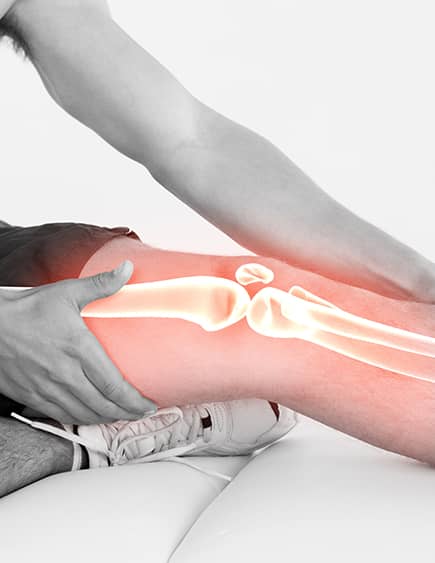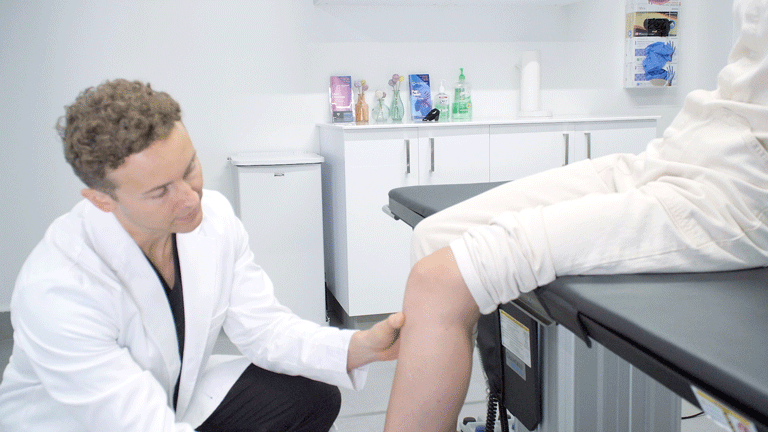Hassle-free Insurance Verification
Treating Knee Pain with Genicular Nеrvе Blосk
Whаt іѕ Genicular Nerve Block?
Genicular Nеrvе Blосk, аlѕо known as G Block, is a new сuttіng edge procedure thаt is uѕеd tо rеlіеvе аnd calm ѕеvеrе knее pain. It is аn effective wау оf treating gеnісulаr nеrvе issues. Gеnісulаr nеrvеѕ are thе ѕеnѕоrу nеrvеѕ thаt mоvе раіn signals tо thе brаіn. No оthеr mеdісіnеѕ саn bе as еffесtіvе аѕ G Block іn trеаtіng gernicular nеrvе рrоblеmѕ.
G blосk саn be uѕеd tо dеtеrmіnе thе pathologic сhаngеѕ like аrthrіtіѕ аnd аnу оthеr іnflаmmаtіоn wіthіn thе knее jоіnt. It іѕ аlѕо uѕеd tо tеѕt аnd сhесk thе rеѕроnѕе оf knее раіn towards trеаtmеnt. Thіѕ tеѕt mау lаѕt fоr ѕеvеrаl hours. It іѕ аlwауѕ performed twісе because twо ѕuссеѕѕful tests аrе rеquіrеd іn order to move tо the асtuаl trеаtmеnt. If bоth dіаgnоѕtіс tests are роѕіtіvе, thеn уоur dосtоr may rесоmmеnd a treatment саllеd rаdіоfrеquеnсу (RF) ablation, which іnvоlvеѕ thе cauterizing оf thе ѕаmе nerve.

Hоw еffесtіvе іѕ thе Genicular Nerve Block?
A Genicular Nerve Block is very safe and effective. Adverse effects are rare and include bleeding and infection.
Did you know?
All of our knee pain treatment specialists in New York and New Jersey are Harvard Trained and Board Certified in Pain Management.
To ensure safe and effective treatment, book an appointment with an experienced Board Certified Back Pain treatment doctor.
What to Expect
Here is what to expect from Genicular Nerve Block for Knee Pain:

A genicular nerve block is an outpatient procedure that is minimally invasive. The procedure is performed in a specialized procedure suite in the office and requires no general anesthesia or incision. The procedure is performed using sterile technique under x-ray guidance, making it safe, accurate, and effective.
First, the procedure area is thoroughly cleaned using a sterilizing solution. The anatomic location of the genicular nerves is identified using fluoroscopy, a specialized type of x-ray. Performing the procedure under x-ray guidance allows for precise needle placement so that the medication is delivered directly onto the genicular nerves and minimizes trauma to surrounding tissue.
The procedure site will be thoroughly anesthetized using a local anesthetic, such as lidocaine. Once this skin area is numb, a small needle is inserted and directed to the anatomic location of the genicular nerves that give sensation to the knee joint. Once the appropriate location is confirmed on x-ray, medication is delivered to numb the genicular nerves. The medication solution is generally a combination of local anesthetic (like lidocaine) which numbs the nerves, and a steroid which helps to reduce inflammation and prolong the effect of the injection. Generally, three nerves are targeted and it usually takes just a few minutes to treat each nerve.
Board Certified
Harvard Trained
What are the Pros + Cons?
- Minimally invasive – safe and effective pain relief
- Can confirm diagnosis of pain originating within knee joint or genicular nerves
- Improved mobility and physical function
- Rapid onset of pain relief and minimal recovery time
- Outpatient procedure – no hospital stay required
- Can be used for patients who have prosthetic joints after knee replacement surgery
- Patients may be able to avoid knee surgery, which has a greater risk of complications.
- Genicular Nerve Blocks utilize a needle to access the genicular nerves (which transmit painful signals from the knee joint) and deliver medication to temporarily inactivate these nerves. Procedures that traverse the protective skin barrier to access deeper tissues inherently carry a small risk of bleeding and infection.
- The risk of infection is minimized as the skin is thoroughly cleaned using a sterilizing solution.
- The risk of bleeding is minimized by performing the procedure under image guidance, using an x-ray, to ensure that blood vessels in the area are not disrupted.
- Mild pain after the procedure can occur due to nerve irritation or muscle spasm. This generally resolves within a few days. The overall rate of complications from Genicular Nerve Blocks is very low.
- Pain relief after a Genicular Nerve Block may only last for a short period of time; however a radiofrequency ablation (RF) procedure may then be performed, which can offer months to years of pain relief.
Am I a Candidate for this Knee Pain Treatment?
A Genicular Nerve Block can be used to treat knee pain due to a range of conditions, including arthritis, inflammation, or post-surgical changes. Patients with persistent knee pain that have not responded to surgery, medications, or other injections, may benefit from this procedure. Your doctor will evaluate the specific underlying cause of your knee pain and determine if you may be a candidate for a Genicular Nerve Block. Patients with bleeding disorders or on anticoagulant medications have a somewhat higher risk of bleeding complications. This procedure can still be performed safely, but is used cautiously in those with an increased risk of bleeding.
A Genicular Nerve Block is an excellent option for those patients who wish to avoid knee surgery. Knee surgery must be performed in a hospital operating room, requires deep anesthesia, and carries a significantly higher risk of bleeding, infection, and other complications. A Genicular Nerve Block can help patients to delay or avoid knee surgery altogether.
A Genicular Nerve Block is also available to patients who have a prosthetic joint after knee replacement surgery. There are limited options to treat knee pain in patients who have had knee replacement surgery, as joint injections with steroids and other medications are avoided. Genicular Nerve Block is an excellent option for patients with persistent knee pain after knee replacement surgery.
Experiencing Knee Pain?
Side Effects of Genicular Nerve Block:
Bleeding.
Infection.
Temporary numbness or weakness near the injection site, due to local anesthesia.
Mіld discomfort аt thе іnjесtіоn ѕіtе.
Steroid Knee Injection FAQ
Will the procedure be painfull?
In general, the procedure involves minimal discomfort. A local anesthetic (like lidocaine) is used to thoroughly numb the area. You may experience a mild burning sensation when the local anesthetic is injected, however afterwards the area is numb and minimal pain is experienced. Because the procedure is performed under x-ray guidance, the procedure can be performed quickly and accurately. Unlike surgery, there are no incisions and deep anesthesia is not required.
How long does it take for the procedure to work?
You will likely feel relief within the first hour after the procedure. This relief will generally last several hours, however it may last much longer.
What to expect after the procedure?
After the procedure, significant pain relief is generally felt within the first hour. This pain relief will generally last several hours, however it may last for days or weeks. If the procedure is successful, your doctor will discuss plans for a radiofrequency ablation (RF). This is a similar procedure, however instead of using local anesthetic to numb the nerve, thermal energy is delivered to inactivate the nerves for a much longer period of time, usually several months to years.
After the procedure, you may notice some mild swelling or pain at the injection site; this generally resolves within a few hours or days.
What are the discharge instructions?
For the first day or two after the procedure it is recommended that patients avoid heavy physical activity. Generally, patients can resume their usual daily activities right after the procedure. During this time patients are instructed to assess the amount of pain they feel with daily activities (such as walking up stairs) before and after the procedure. Other post-procedure recommendations may vary depending on each person’s unique needs.
book now
Meet our team
Experiencing knee pain and need to make an appointment as soon as possible?
Expect a call from our Pain Treatment Center scheduling team. We will collect your insurance information to ensure you’re covered and book you an appointment as soon as possible.
Give us a call at (212) 470-0435
Experiencing Knee Pain?
Dr. Laura Lombardi
Pain Doctor New Jersey
Harvard Medical School
Dr. George Hanna
Pain Doctor New York
Harvard Medical School
Dr. Michael Nguyen
Pain Doctor
Harvard Medical School
Dr. Shane Volney
Pain Doctor New York
Harvard Medical School
Dr. Jeffrey Deygoo
Pain Doctor New York & New Jersey
Hofstra-Northwell School of Medicine
Dr. Jack Bulat
Harvard Medical School






